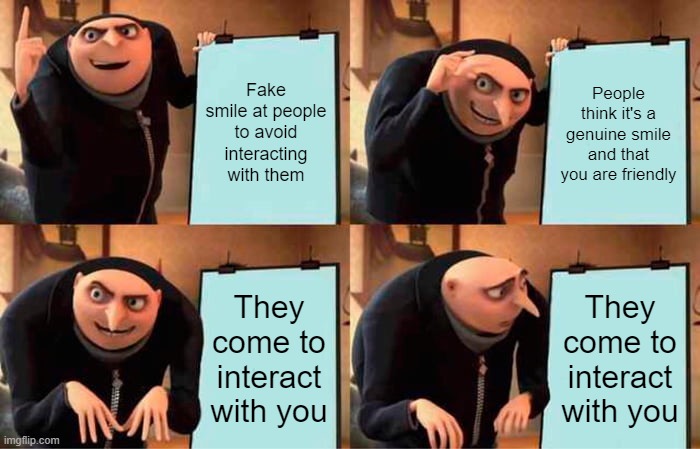Table of Contents (click to expand)
Smiling does make people look more trustworthy, but not all smiles are equal. True smiles, which use very specific face muscles, namely the orbicularis oculi (the muscle responsible for blinking) and the zygomatic major (the muscle that raises the corners of the mouth), are considered more trustworthy than social smiles, also called “fake smiles”, which don’t use these muscles.
What is a smile? It’s a facial expression where the corners of the mouth are turned up and out, gently exposing the front teeth.
Smiles are very important tools in communication and tend to convey happy positive feelings. After all, who doesn’t like looking at a soft, sweet and sparkling smile?
The question is, why do we like smiles? And what do smiles communicate? While a definite answer remains elusive, there are a few possible answers, one of which is that smiles elicit trust!
How Are Smiling And Trust Related?
Prehistoric humans would live in groups. The stronger the group or tribe, the better their chances of survival. One way to strengthen the group was to improve trust amongst its members, such that each member would carry out their role perfectly. Smiling would build such trust, as it would let the other group members know that one person meant no harm to the other.
Even now within social circles, friends or significant others who smile more are trusted more than non-smiling ones.
Interestingly enough, one study found that even gender can influence the smile-trust relationship. Smiling females, as it happens, appear to be more trustworthy than smiling males.

Also Read: Can Smiling Make You Happier? The Intriguing Power Of The Facial Feedback Hypothesis
Difference Between True Smiles And Social Smiles
However, there is a catch. You may not come off as trustworthy just by smiling more. In fact, it can be quite the opposite; you may come off as creepy. Why? Because the way you smile matters a lot! Your smiles have to seem genuine and true, not fake or “put on”.
True smiles, also known as honest smiles or real smiles, are those that occur naturally. Such smiles are characterized by the use of specific facial muscles, namely the orbicularis oculi (the muscle responsible for blinking) and the zygomatic major (the muscle that raises the corners of the mouth).
To put it simply, true smiles are those that are actually real, genuine, heartfelt and are mostly involuntary. When someone flashes a true smile at us, we instinctively smile back to reciprocate the kind gesture.

Social smiles are the well-known fake smiles that we are obligated to give during social encounters. When we meet a boss we don’t like, or bump into an ex we’d rather forget, we smile because it’s customary, not because we are sincerely happy. Such smiles are only given out voluntarily and are often forced, so they rarely seem like natural smiles.

So, while we can force ourselves into a social smile, true smiles are not under our direct control. Sure, there are plenty of con artists who are excellent at faking such smiles, but for the layperson, these smiles come naturally when we feel happiness or joy.
Also Read: Why Is It Hard To Smile Naturally In Photographs?
The Trustworthiness Of A Smile
As mentioned earlier, the way we smile matters a lot, but so does the rest of our body language. One study focused on determining how trustworthy a smiling person can appear, depending on their gaze.
The study found that if your eyes look red and angry when you smile, you will seem less trustworthy. That could also be true if you’re smiling with an otherwise scary look on your face… you could end up looking like the clown from IT. No matter how much he kept smiling throughout the movie, he never came across as trustworthy!
If you smile at someone with open friendly eyes and a happy expression, you will seem more trustworthy. When someone talks about “honest eyes”, this is what they mean. There are some people who give out a more friendly and forthcoming vibe. This is because of their welcoming facial expressions, coupled with their “true” smiles.

A Final Word
To answer the main question… yes, smiling can make you seem more trustworthy and friendly. However, the way you smile also matters. The happier a person’s face seems, the more trustworthy that person will appear to be when judged by observers.
This phenomenon doesn’t exclusively apply to humans. Smiling at dogs will make them more likely to approach and trust you. One study found that smiling at a dog can boost their happy hormone (oxytocin) levels and help build trust. A dog will find it easier to form an attachment or bond with a smiling human as opposed to an angry-looking one.
However, there are limitations to this phenomenon. How a person judges you based on your smile depends on their past relationships and interactions. You may think that your smile is genuine, but some people may find it to be fake based on the way they perceive and judge facial expressions.
The best thing to do is just remember to focus on smiling naturally if you want to win someone’s trust, because handing out fake smiles might do more harm than good!
How well do you understand the article above!

References (click to expand)
- Somppi, S., Törnqvist, H., Topál, J., Koskela, A., Hänninen, L., Krause, C. M., & Vainio, O. (2017, October 17). Nasal Oxytocin Treatment Biases Dogs’ Visual Attention and Emotional Response toward Positive Human Facial Expressions. Frontiers in Psychology. Frontiers Media SA.
- Reed, L. I., Meyer, A. K., Okun, S. J., Best, C. K., & Hooley, J. M. (2020, June 25). In smiles we trust? Smiling in the context of antisocial and borderline personality pathology. (R. Didden, Ed.), Plos One. Public Library of Science (PLoS).
- Centorrino, S., Djemai, E., Hopfensitz, A., Milinski, M., & Seabright, P. (2015, January). Honest signaling in trust interactions: smiles rated as genuine induce trust and signal higher earning opportunities. Evolution and Human Behavior. Elsevier BV.
- Galinsky, D. F., Erol, E., Atanasova, K., Bohus, M., Krause-Utz, A., & Lis, S. (2020, December 3). Do I trust you when you smile? Effects of sex and emotional expression on facial trustworthiness appraisal. (M. A. Pavlova, Ed.), Plos One. Public Library of Science (PLoS).
- Fernández-Martín, A., Álvarez-Plaza, P., & Carqué, L. (2017). Trustworthiness of a smile as a function of changes in the eye expression. Psicothema, (29.4), 462–468.
- Campellone, T. R., & Kring, A. M. (2013, June). Who do you trust? The impact of facial emotion and behaviour on decision making. Cognition & Emotion. Informa UK Limited.
- Niedenthal, P. M., Mermillod, M., Maringer, M., & Hess, U. (2010, December). The Simulation of Smiles (SIMS) model: Embodied simulation and the meaning of facial expression. Behavioral and Brain Sciences. Cambridge University Press (CUP).
- Ramachandran, V. S. (1998, October). The neurology and evolution of humor, laughter, and smiling: the false alarm theory. Medical Hypotheses. Elsevier BV.
- Heerey, E. A., & Gilder, T. S. E. (2019, December 2). The subjective value of a smile alters social behaviour. (M. A. Pavlova, Ed.), Plos One. Public Library of Science (PLoS).
